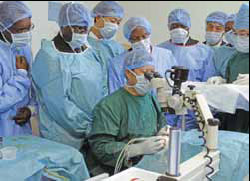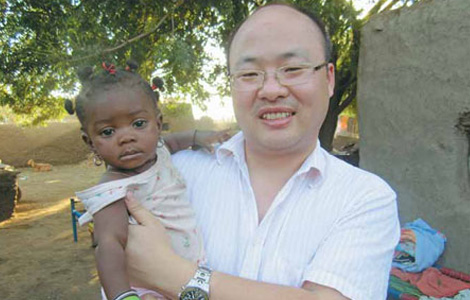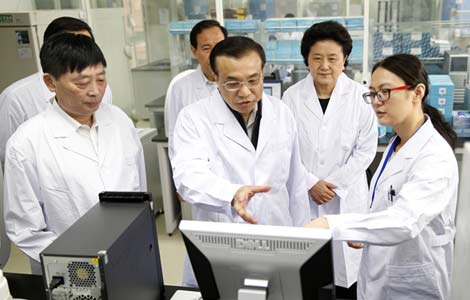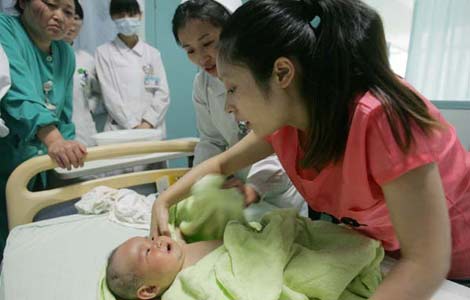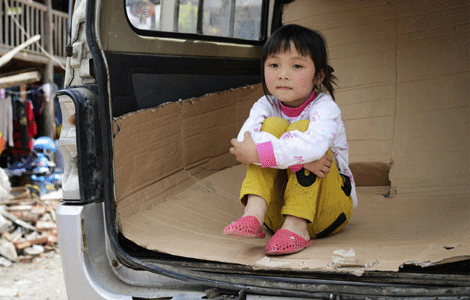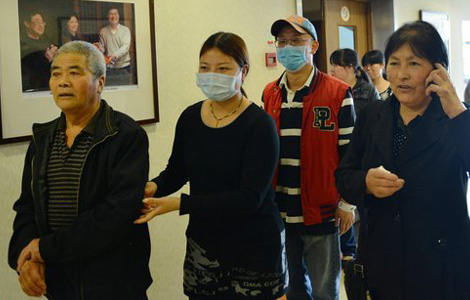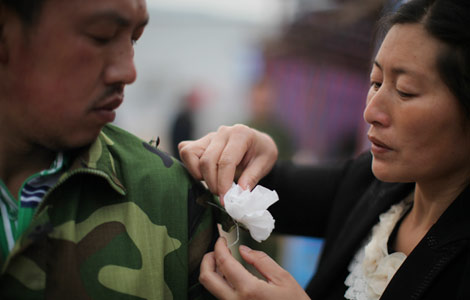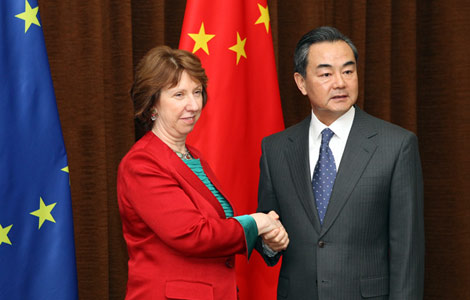Chinese doctor brings vision to African patients
Updated: 2013-04-29 07:53
By Sun Yuanqing and Meng Jing (China Daily)
|
||||||||
|
Zhu Siquan (center) has developed a set of medical techniques for the treatment of late-stage cataract. Provided to China Daily |
When Zhu Siquan developed a whole set of medical techniques for the treatment of late-stage cataract among Chinese patients in the 1990s, he did not expect that his endeavors would one day benefit patients in Africa.
As the principal doctor of the China-Africa Brightness Action that has cured about 2,000 cataract patients in Africa, Zhu said China is in an advantageous position to help Africa due to its unique development experiences.
"Western doctors have tried, but they have failed in Africa. Most of the patients in Africa are similar to the patients we treat in China. Most of them have hyper-mature cataract, and often with complications. Western physicians are adept in ultrasonic techniques, which is effective only in early-stage patients, but not for those in Africa," Zhu said.
Zhu, one of the top eye doctors from China, and his 30-member team have made three trips to Africa since 2011, covering destinations like Zimbabwe, Malawi, Mozambique and Zambia.
The campaign, launched by the Beijing-based Tongren Hospital and sponsored by Hainan Airlines, originally started in China's Qinghai-Tibet Plateau, where the strong sunlight results in millions of cataract patients. The non-governmental group later promoted it in Africa where the rate of cataract was similarly high and the medical condition was not much better.
There were fewer than 20 eye doctors in the whole of Zimbabwe, and each doctor was capable of doing three to four operations a day, Zhu said about his first trip to Africa.
"I was stunned. There wasn't even an ultraviolet radiator or disinfectant in the whole operation room. It was like the 1960s in China."
While it is rare to see patients losing eyesight now due to cataract in China, it was not the case during the 1960s and 70s, and is still the case in Africa, he said.
Zhu was first introduced to Western equipment in the 1990s, when Tongren Hospital imported them from the US. However, the equipment failed to the meet the demands of the late-stage Chinese cataract patients. Zhu had to discover a series of new applications that applied specifically to the Chinese patients at that time.
"The American professor who tutored me on the usage of the equipment was amazed when I demonstrated the techniques. They dubbed it as the 'Chinese kungfu'," Zhu said.
With his unique techniques, Zhu usually has hundreds of patients waiting outside his office on a typical afternoon. But the workload is dwarfed by what he has experienced in Africa.
On a typical day in Africa, Zhu had to see more than 300 cases, which means he had to perform one operation within three minutes. Zhu said his cervical problems worsened due to the heavy workload.
But the overwhelming gratitude and infectious delight from his patients has carried him on. "An African patient who lost his vision for more than 20 years was astonished when he regained his sight after a mere three-minute operation. He was not convinced until he physically checked each and every hand in the room.
"His first sight was also astonishing as he saw only Chinese faces. He ended up saying that in 20 years all of us seem to have got yellow skin.'"
Zhu said his fame preceded him everywhere in Africa that not even golf courses would allow him to tip. They often called me the magical Chinese doctor, he said.
"I can really feel the sincerity of their (African people) wishes. This is what connections between nations are. As a doctor, we cure people regardless of race and nation. Our calling comes knocking as soon as we see people who are suffering from sickness. Their support adds to our sense of responsibility," Zhu said.
Zhu also praised the dedication of his co-workers and volunteers from Hainan Airlines, who helped organize and guide the hundreds of patients every day despite fatigue and illness.
"Many become sick after landing in Africa, but they kept on working. Without them, I could never have made it. As long as they carry on, I have no excuse to pause. In the end I was the one who was earning all the credits, but they are the real unsung heroes."
The three trips to Africa have left Zhu with refreshed impressions of the continent.
"They are so eager to learn that they stand all day long, watching and asking."
The respect the African patients show to doctors is also something that Zhu found impressive. When one patient failed to get in after waiting for a whole day, he came to Zhu and bowed and said: "Thank you doctor Zhu, you had a very hard day. I will come back tomorrow."
"That was something I haven't heard for a long time. The friendliness was mutual. In China, a patient could get really upset instead of considering the doctor's workload."
Zhu is now preparing for his next trip to Africa, recruiting new members for the medical team. He has to pin down the strength to 10 from the over 50 candidates. "We want the best. With a workload like that, you have to be very careful. In China, the patients might still have chances for patch ups. In Africa, this is their only chance. There is no room for failure."
(China Daily 04/29/2013 page3)
Most Viewed
Editor's Picks

|

|

|

|

|

|
Today's Top News
Chinese NGOs reach out to African countries
Abe defends shrine visits
Premier Li: 'High alert' to remain on bird flu
China to enhance ties with Argentina
Technology fair eyes innovation
'Wang-Koo meeting' anniversary marked in Taipei
China joins rush for Mars
A camper's life traveling the open road
US Weekly

|

|
